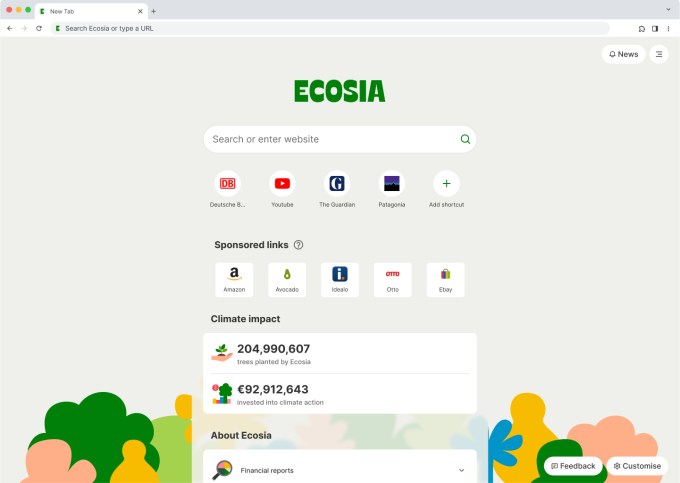Tree planting search engine Ecosia launched a new cross-platform browser today to increase its online footprint.
The new browser, available for Mac, Windows, iOS, and Android, is built on top of Chromium. That’s why there aren’t many feature differences from Chrome. The company sees that as a good thing as people might be tempted to switch over without letting go of their web browsing routine. However, you can customize the landing page and remove sections — such as top sites or climate impact — that are not to your liking.

Image Credits: Ecosia
Michael Metcalf, Ecosia’s chief product officer, told TechCrunch over a call that the company built a browser to expand its sustainable presence.
“The main reason we are building a browser is because we want to go where our users are and start to expand the footprint of where they can be sustainable. Right now, our main use case is around search, but we want to expand into parts of browsing experiences,” Metcalf said.
Ecosia is also starting an affiliate shopping program with the launch of this new browser. Users will see links to shopping sites like Amazon, eBay, and Decathlon under the sponsored links section.
The company said all the money earned through affiliate revenues will go towards planting trees and backing other green projects. Through this kind of investment, Ecosia has committed to generating 25Wh of clean energy per user each day they browse.
Metcalf said that while the company promotes lower consumption, it is aware that people shop frequently, and with the affiliate program, they have an opportunity to give back.
In the future, the company wants to improve the affiliate shopping interface, integrate its AI chatbot, and add more customization to the browser.
It’s tough to ask people to change their browsers, so the company aims to target its current user base of 20 million initially, along with marketing targeted towards casual green users. The company said that it was happy with the retention rate in its early beta testing. However, it doesn’t have any data on whether there was any impact on the amount of Ecosia searches when a user switches to the company’s browser.
Ecosia made a few structural changes to its search engine last year. After years of using Bing as a sole search provider, the company started experimenting with Google search in markets like Canada, New Zealand, Brazil, and the Philippines. The company uses System1, which syndicates search results from Microsoft Bing, Startpage, and Info.com in other geographies.
Earlier this year, Ecosia also crossed the mark of planting more than 200 million trees across 95,000 locations worldwide.
